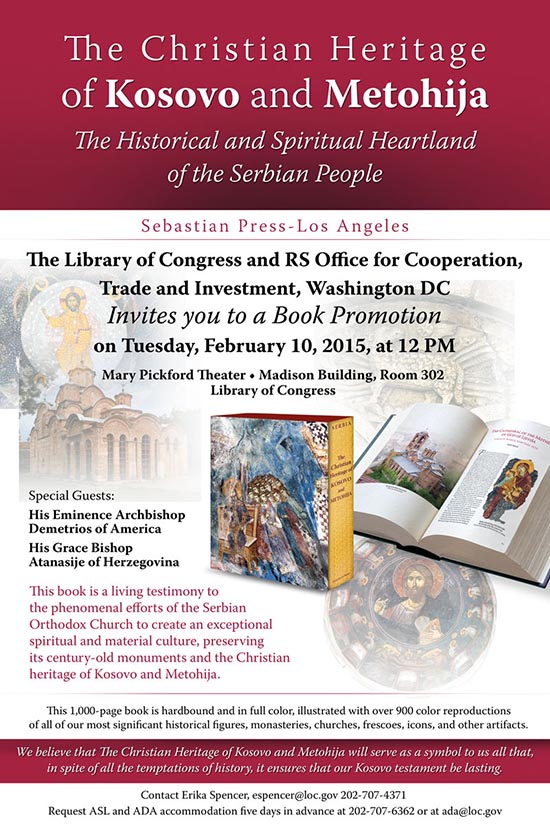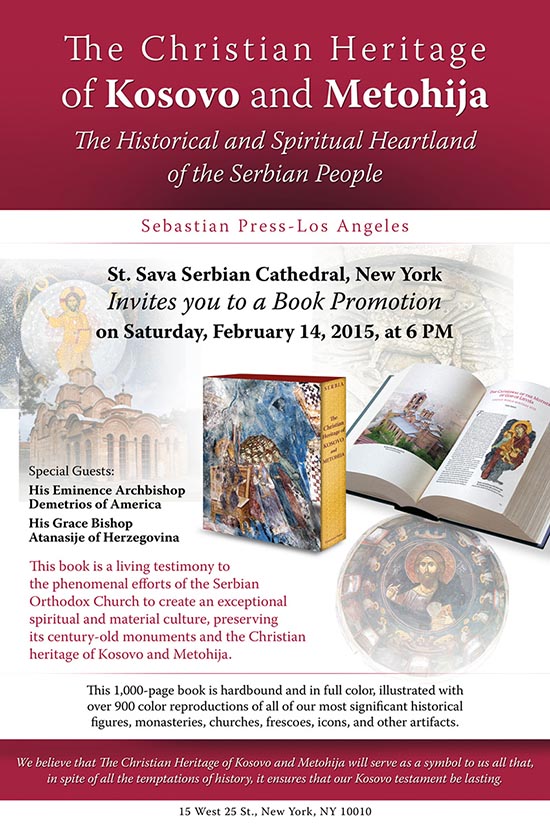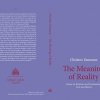A great man is one who collects knowledge the way a bee collects honey and uses it to help people overcome the difficulties they endure - hunger, ignorance and disease!
- Nikola Tesla
Remember, remember always, that all of us, and you and I especially, are descended from immigrants and revolutionists.
- Franklin Roosevelt
While their territory has been devastated and their homes despoiled, the spirit of the Serbian people has not been broken.
- Woodrow Wilson
Serbica Americana Newsletter - January 24, 2015
Latest Articles
- Crafting Pišanice - Serbian Easter Eggs with Natural Dyes
- From Nicaea to Today: The Enduring Legacy of Synodality and Unity in the Church
- The Role of the Deacons in the Church
- The Circle of Serbian Sisters
- Vinka Ellesin
- Богородица као екстатично биће
- Bishop Maxim's Homily During the Assembly of Bishops XII Opening Liturgy
- Leon Joseph Lysaght Jr.
- Olga Gradojevich
People Directory
Danilo Marić
Danilo Marić was born on August 26, 1938, in Mostar (Kosor), Bosnia and Hercegovina, Europe. Kosor is cetrically village in the Mostar valley – Bisce polje, which has the most rivers in the world: Neretva, Radobolja, Jasenica, Posrt, Buna and Bunica. He was fascinated by these rivers from childhood on, and these waters influenced the development of his character and his literary works. . Read more ...Publishing
The Meaning of Reality
Essays on Existence and Communion, Eros and History
by Christos Yannaras
The collection of articles traces the thought of Christos Yanaras through his long journey in discovering the meaning of existence, communion, eros, and history. It is a cause of immense joy that no fewer than twenty articles of passionate significance and substance have at present been gathered together in this volume under the title The Meaning of Reality.
Yannaras is undoubtedly one of the most significant thinkers of our time. Kallistos Ware once described him as "the most creative and prophetic religious thinker at work in Greece today," while Rowan Williams characterizes him as "one of the most significant Christian philosophers in Europe." His very wide and no less deep education helps him to develop an inimitable blend of philosophy, theology, and social criticism, and to speak in an original way about the traditional and contemporary issues of human existence, as well as the latest challenges of modern empirical science and political engagement. A detailed knowledge of the writings of the Holy Fathers has always been his foundation amidst the labyrinth of modern thought - which is inimately bound up with psychoanalysis, environmental issues, human rights, postmodernism, and pluralism , to mention just a few. Insistence on the primacy, uniqueness, and eternal value of human personality prevails in almost all his works and inspires his own vigorous theological and ecumenical engagement, based on the Orthodox eucharistic and ascetic tradition.
Latest US News
- Волт Богданић: Американац српског порекла добитник три Пулицерове награде за истраживачко новинарство
- The American Srbobran - Building a Partnership with the Library of Congress and Institutions in Serbia
- „Американски Србобран“ унапређује сарадњу са Конгресном библиотеком у Вашингтону и институцијама у Србији
- Преминуо чувени амерички песник српског порекла Чарлс Симић
- Јован Дучић међу великанима у кливлендској башти
- Србија, Африка, Америка и Канада славе дан Теслиног рођења
- Документарац Немање Станковића приказан у Холивуду
- Tesla Rhapsody
- Saved by Beauty: Dostoevsky in New York
- Izložba likovnih radova o Dostojevskom
- Steve Popovich - the man who discovered Meat Loaf
- Odlazak čoveka koji je mnogo uradio za očuvanje sećanja na lik i delo Nikole Tesle
- Naš otac Balkanac za Ruse je smislio bijelu Coca-Colu
- Neverovatan poduhvat srpske pravoslavne zajednice u Americi
- Prva Srpkinja u finalu najveće evropske nagrade za pronalazače
Latest Serbia News
- На Станфорд листи 15 крагујевачких научника
- Naše postojanje skriva mračne i svetle strane, i veliko je umeće prepoznati ih i razlučiti
- Српска застава је најлепша на свету – на основу резултата анкете милион људи
- Недеља америчке културе
- Preminuo pisac Aleksandar Petrov
- Spomenik Branku Pešiću radiće srpski vajar iz Los Anđelesa
- Metropolitan Amfilohije buried in the Cathedral church in Podgorica
- Memorial prayer rite for Metropolitan Amfilohije in the Cetinje Monastery
- На данашњи дан рођен је Михајло Идворски Пупин
- Алекса је стигао до Принстона, али Математичкој гимназији се радо враћа
- Каубој православац и 40 Американаца посетили Косово
- Архив Војводине: Сведочанства времена у спомен на херојске претке
- Премијера „Теслиног народа“ на Коларцу
- Када се велики умови играју науком о подацима
- Američka vojska donirala je vrednu opremu klinici u Nišu






